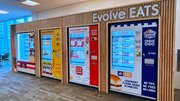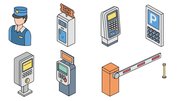Hardware
2023 outlook: Kiosks ride automation’s surge
Kiosk industry executives are bullish for 2023 as consumer acceptance of self service technology expands and businesses look to automation for relief from a labor shortage.

January 2, 2023 by Elliot Maras — Editor, Kiosk Marketplace & Vending Times
Businesses, retail properties and travel centers continue to roll out self-service kiosks at a rapid pace as consumers increasingly seek out automated purchasing options, bringing smiles to kiosk industry executives heading into 2023.
And while economists warn of a possible recession, kiosk executives interviewed at random by Kiosk Marketplace expressed uniform optimism. Customer acceptance of technology gained traction during the coronavirus pandemic, and the acceptance continues to grow.
And while the current labor shortage impacts just about all industries, kiosk executives are quick to point out that businesses are looking to self-service technology as a solution to alleviate this problem.
 |
John Dittig |
"If the economy takes a dip, technology with self service will help these companies make it through," John Dittig, senior leader in business development at Samsung Electronics America, told Kiosk Marketplace in a phone interview. Companies that deploy self service will be able to reassign existing employees to other roles. This applies to restaurants, retailers, hospitality providers, sports and entertainment accounts.
 |
Reda El-Khayer |
"There's a clear challenge in terms of labor shortage for our customers," said Reda El-Khayer, global vice president of marketing at Acrelec, a manufacturer of customer experience hardware and software. "Our business is to save time for everyone." Pilot tests are indicating kiosks are delivering higher sales and shorter customer wait times, he said.
"I feel pretty optimistic," agreed Frank Olea, CEO of Olea Kiosks Inc., noting that self-service equipment helps businesses control costs. "We're kind of in a sweet spot." All customer verticals are healthy for Olea.
 |
Frank Olea |
Research points to growth
Research confirms consumer acceptance of self service continues to grow.
Most consumers (57%) expect stores to invest in digital payment and self-service technology, while 55% expect to see interactive screens that let them explore options and customize services or products, according to the 2022 ChaseDesign|JGA Tech at Retail Survey, a study that polled more than 12,000 shoppers in the U.S., U.K., France, Spain, Germany, The Netherlands and China.
Most shoppers (76.7%) are interested in interactive displays that provide information on different brands, which gives retailers the ability to orchestrate buying behavior, according to the study.
More supermarkets installed self-service technology during the pandemic because of staffing issues and customers' fears about interacting with more humans than necessary, according to a September 2022 report in The Wall Street Journal, citing statistics from the FMI —The Food Industry Association. Self-checkout was nearly twice as widespread in 2021 as it was before the pandemic, representing 30% of all grocery store transactions alone.
Mark Baum, who oversees industry relations for FMI, does not see the labor crisis ending soon. Self-checkout machines, which cost from $14,000 to $40,000 to install, pay for themselves quickly. Stores typically only have one or two workers for every five to 10 machines, instead of one cashier per lane.
Consumer acceptance grows
 |
John Wagner |
"The younger generation wants to get in and get out," said John Wagner, key account manager at Pyramid Computer, an IT manufacturer specializing in the design and production of self-serve kiosks and orders solutions. "We think the next year kiosks are going to continue to evolve."
The growth of self-checkout in the QSR channel has expanded to the convenience stores, Wagner said. He expects convenience stores and fuel stations to install more outdoor order kiosks. He also sees the retail self-checkout trend driven by Amazon Go expanding to smaller retailers.
"I'm very bullish about 2023," agreed Douglas Shipley, senior OEM account manager at Zebra Technologies, a self-service solutions equipment provider. "If things are tightening for people, they'll go to the QSR and they'll buy because there's a deal." He also sees more properties adding pickup lockers.
 |
Douglas Shipley |
Like most executives interviewed, Shipley said the supply chain issues that were prevalent for much of the year have eased. He expects full recovery on this front in 2023.
Innovation continues
 |
Juan Perez |
"I think the pandemic drove a significant amount of innovation due, in large part, to labor shortages and increases in off-premise dining," said Juan Perez, senior product manager for hospitality and foodservice technologies at Panasonic Connect North America. "Increased automation of order-taking at the drive-thru and personalized guest-experiences, for example, are two areas that will continue to drive new innovation in foodservice."
"We're extremely optimistic," said Matt Redwood, vice president, retail technology solutions at Diebold Nixdorf Inc., a technology and solutions provider. "Consumers are using self-service more often."
 |
Matt Redwood |
Manufacturers confront staffing issues
While most kiosk executives acknowledge the labor shortage has created staffing challenges for their companies as well as their customers' companies, layoffs at some of the larger tech companies, such as Amazon, have benefitted smaller technology players.
 |
Steve Latham |
"People (in the tech industry) are starting to look for jobs again," said Steve Latham, CEO of Banyan Hills Technologies, a software provider, integrator and consultant focusing on the kiosk industry.
Latham said he has been able to add some technology specialists that are helping the company develop image recognition.
Customer verticals evolve
 |
Ben Williams |
"It's really good to be in the kiosk industry right now," agreed Ben Williams, president and CEO at TouchMate Inc. USA, a manufacturer of poin-of-sale technology. "They (customers) are having to look at self service." The company focuses on cinemas and has expanded into kiosks for cannabis dispensaries and gun stores.
TouchMate was one of several manufacturers that has expanded into the rapidly growing EV charging station sector. The company has introduced a kiosk for EV charging stations that offers programmatic advertising.
"It's going to be a banner product for us," Williams said with regard to EV charging stations.
Looking to the future, Williams has his eye on touchless touchscreens.
 |
Rick Smith |
Rick Smith, director of business development at Elo Touch Solutions Inc., was among several executives who cited health care as one of the faster-expanding verticals this past year, following the rapid growth at retail and foodservice. He thinks a lot of companies used the pandemic downtime to refocus their market strategies.
 |
Bhavin Asher |
Grubbrr, a software provider that focuses on self-serve kiosks for QSRs, has also expanded into the EV charging station sector, said company founder Bhavin Asher.
"It's been gangbusters all year non-stop," said Asher, adding that the company's business doubled in 2022, a record year.
Android OS emerges
Asher was also among several executives who said the Android operating system is making self-serve kiosks more affordable.
"Finally, Android has become mainstream," he said.
James Gribbin III, a sales account manager at Metropolitan Sales Co., a kiosk distributor, agreed the Android operating system is creating more opportunities for kiosks. He sees Android offering more open source capabilities that enable the integration of functions.
 |
James Gribbin III |
Gribbin was also among several kiosk executives who are encouraged by the return of industry trade shows in 2022, following poorly attended shows in 2020 and 2021.
"I think people are starting to get out," Gribbin said with respect to the return of trade shows.
Gribbin sees growth in all customer verticals: foodservice, retail, convenience stores, financial institutions, laundries and car washes.
Technology evolves
Meanwhile, technology continues to evolve and create more growth opportunities.
Olea at Olea Kiosks said his company has invested in robotic welders to offset the cost and lack of available human welders.
El-Khayer at Acrelec sees artificial intelligence, facial recognition and predictive ordering playing a bigger role in restaurants, where kiosks will greet customers by their names and offer their favorite meals and make suggestions based on the weather and the time of day.
Samsung has developed a check-in solution that uses facial recognition that delivers the guest a key in 30 seconds, said Dittig, who noted that hotels in particular have rebounded from the pandemic.
Redwood at Diebold Nixdorf sees AI as the biggest driver for "just walk out" retail technology, supporting facial recognition, age verification and product recognition. Product recognition technology can eliminate the need for barcodes.
Michael Jaszczyk, U.S. CEO of GK Software, credited AI with enabling real-time analytics and more personalized recommendations and personalized promotions including coupons and loyalty rewards.
Jaszczyk is also hopeful that cryptocurrency will find its niche in self service, although it may require government regulation. Cryptocurrency acceptance has the potential to allow retailers to save on transaction fees.
"It's important that people remain optimistic," said Ross Tocher, president of Qwick Media Inc., a Canada based provider of interactive hardware and software. He said retailers can optimize their kiosks by offering some type of reward, such as recipes. Tocher based this on his own pilot tests for U.S. retailers.
Tocher, who focuses heavily on tourism locations, has witnessed a revival in tourism business. By Q4, his business was 80% of pre-pandemic level, as hotels and tourism centers replace paper brochures with kiosks.
"As consumers return to brick-and-mortar stores in full force, they're coming back with evolved shopping habits and expectations and seeing both online and offline as part of the same purchase journey," Scott Moore, global CMO, Mood Media, an in-store media solutions provider, said in a prepared statement.
All images provided.
About Elliot Maras
Elliot Maras is the editor of Kiosk Marketplace and Vending Times. He brings three decades covering unattended retail and commercial foodservice.
Included In This Story
Zebra Technologies
Zebra’s scan engines for self-service kiosk solutions give customers seamless quick service technology while providing a long lifecycle they can count on.
ACRELEC
ACRELEC is a global technology company focused on reinventing the customer experience for restaurant and retail brands. Leveraging decades of software, hardware, and service expertise, we develop and integrate new platforms that increase customer engagement, optimize efficiency, and improve operations.
 ChatGPT
ChatGPT Grok
Grok Perplexity
Perplexity Claude
Claude










